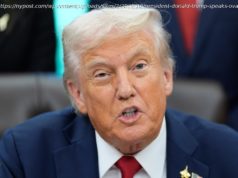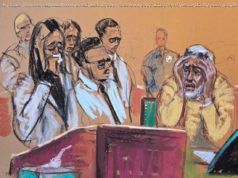A recent ruling reinforced a message that it’s not enough to show that conduct may have had some tangential impact on a case like the investigation of Russian influence in the 2016 election.
There is a great deal of talk about how Robert S. Mueller III, the special counsel, may be trying to build a case of obstruction of justice as part of his investigation of Russian interference in the 2016 election.
Whether enough evidence exists is an open question, although there are bits that could be the building blocks of an obstruction case. The New York Times reported a few weeks ago that John Dowd, who was President Trump’s lawyer, had discussed possible pardons for Paul Manafort and Michael T. Flynn with their lawyers. Then there was the president’s decision to fire James B. Comey as director of the Federal Bureau of Investigation, and Mr. Comey’s memos show Mr. Trump’s near obsession with being cleared of the tawdry allegations in a dossier compiled during the presidential campaign.
But did those efforts constitute obstruction of justice? Before one jumps to any conclusions, it’s worth examining the Supreme Court’s decision in a tax case last month. The ruling continues a trend of narrowing the laws used to prosecute an obstruction case. The court’s message has been that more is needed to prove obstruction than just conduct that might have some tangential impact on how prosecutors put together a case.
In Marinello v. United States, the justices reviewed the conviction of a defendant for violating a provision called the “omnibus clause,” which makes it a crime for anyone who “obstructs or impedes, or endeavors to obstruct or impede, the due administration” of the tax laws. The jury convicted Mr. Marinello of failing to file tax returns for his business after he used funds for personal expenses and paid employees in cash without any tax withholding while discarding business records.
The Justice Department, in defending the obstruction conviction, argued that conduct that makes it more difficult for the Internal Revenue Service to determine the amount owed in taxes constitutes an endeavor to obstruct the tax laws. Under this approach, just about anything that might cause the I. R. S. a problem could conceivably be a violation.
The majority opinion by Justice Stephen G. Breyer took a narrower view of the provision. It found that to prove a violation, the government must show “there is a ‘nexus’ between the defendant’s conduct and a particular administrative proceeding, such as an investigation, an audit or other targeted administrative action.” This nexus requirement makes it harder to establish obstruction because prosecutors must show what the defendant knew about an impending investigation or administrative action, and that the conduct was intended to make it more difficult to complete it.
The court took a dim view of the government’s argument for a broad reading for the law: that prosecutors would use good judgment and not overreach when bringing obstruction charges. Justice Breyer explained that “to rely upon prosecutorial discretion to narrow the otherwise wide-ranging scope of a criminal statute’s highly abstract general statutory language places great power in the hands of the prosecutor” — too much power, in the justices’ view.
The Marinello decision is just the latest case to narrow broad obstruction laws out of concern that prosecutors could take the provisions too far. The court relied on three earlier decisions overturning obstruction convictions to support its conclusion that an expansive view of this type of conduct would be problematic despite the broad language used by Congress.
The nexus requirement for proving obstruction of justice was recognized in United States v. Aguilar, a 1995 decision that overturned the conviction of a federal judge who had lied to F. B. I. agents about tipping off a friend that he was the subject of a wiretap. The court held that “if the defendant lacks knowledge that his actions are likely to affect the judicial proceeding, he lacks the requisite intent to obstruct.” Although one would expect a federal judge to know that lying to investigators would have an impact, the court required proof of actual knowledge that the false statements would be provided to the grand jury, not just a general familiarity with how the process worked.
In Arthur Andersen v. United States, a 2005 decision, the court unanimously overturned the obstruction conviction of the accounting firm. Arthur Andersen had been convicted of destroying records shortly before the Securities and Exchange Commission began an investigation into financial misstatements by its client Enron. A defendant “cannot be someone who persuades others to shred documents under a document retention policy when he does not have in contemplation any particular official proceeding in which those documents might be material,” the opinion explained.
In 2015, the court restricted the scope of a statute that was adopted as part of the Sarbanes-Oxley Act to make it easier for prosecutors to pursue obstruction cases in the wake of Enron’s collapse. The law makes it a crime to conceal, alter or destroy “any record, document or tangible object.”
In the case, Yates v. United States, a majority of the justices held that a “tangible object” did not include undersized fish that the defendant had been caught with on his fishing boat but that he threw overboard before returning to port. Although a fish is indeed tangible, the statute was narrowed to cover only those items that hold information, similar to a record or a document, and not just anything with a physical existence.
Justice Ruth Bader Ginsburg’s opinion noted that “an aggressive interpretation of ‘tangible object’ must be rejected,” and a narrower reading must be adopted to avoid making the destruction of just about anything with possible value in an investigation into obstruction of justice.
Mr. Mueller is reportedly looking at the possibility that there were attempts to obstruct the investigation in Russian meddling in the election. For the most part, actions or statements that might be considered obstructive are open to conflicting interpretations. Whether it be the firing of Mr. Comey or talk of removing Rod J. Rosenstein, the deputy attorney general, these acts are probably insufficient alone to prove obstruction in court because they would be lawful actions, so inferring the requisite intent would be a significant challenge.






